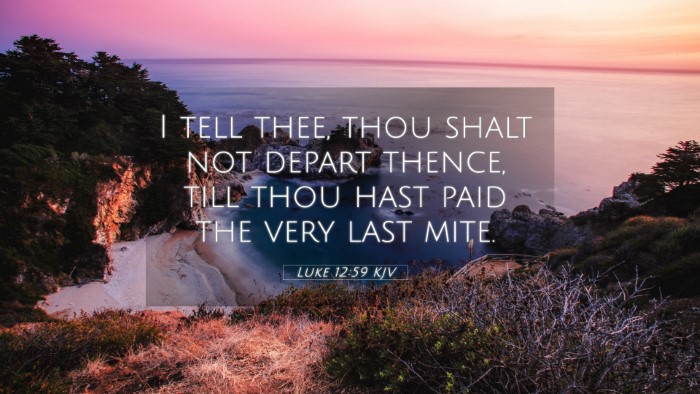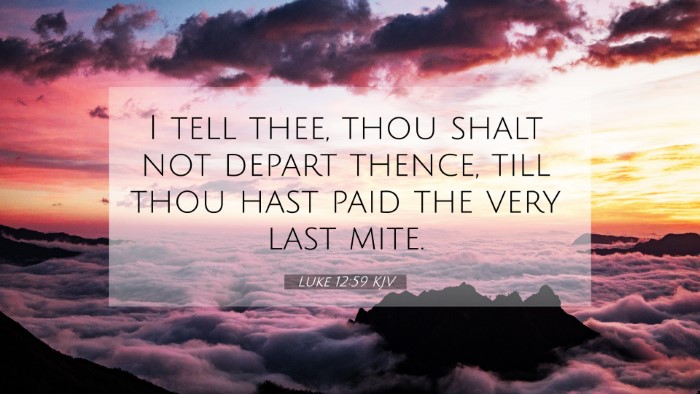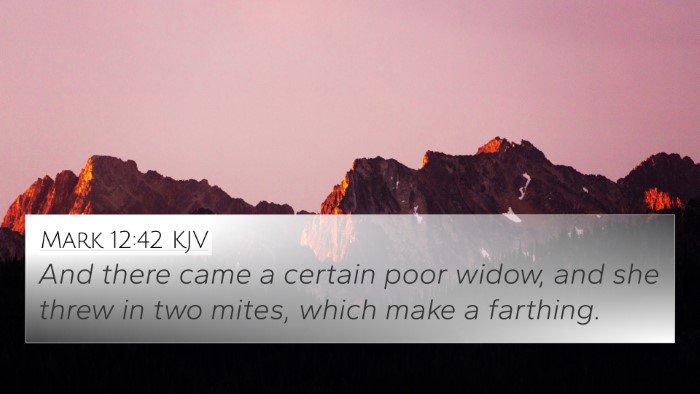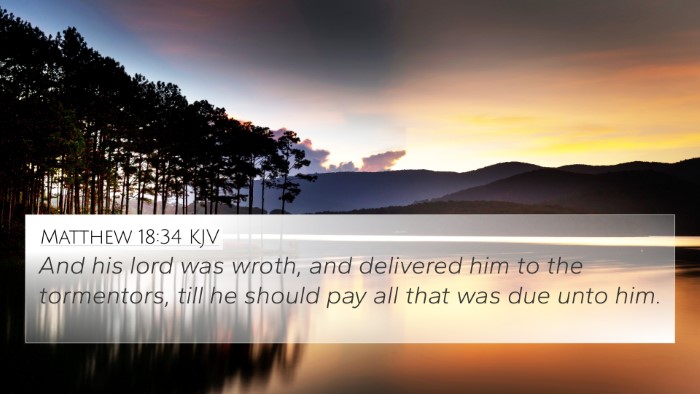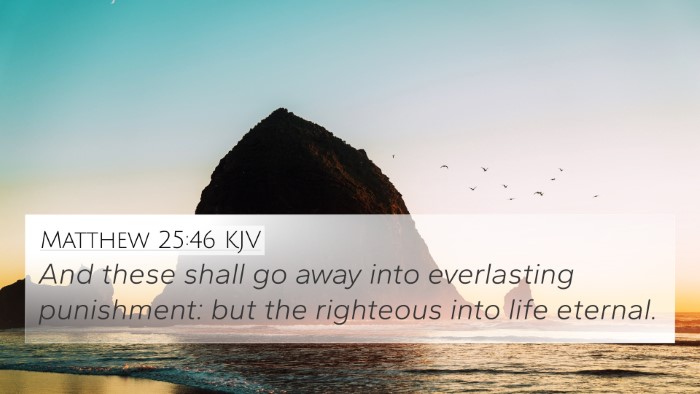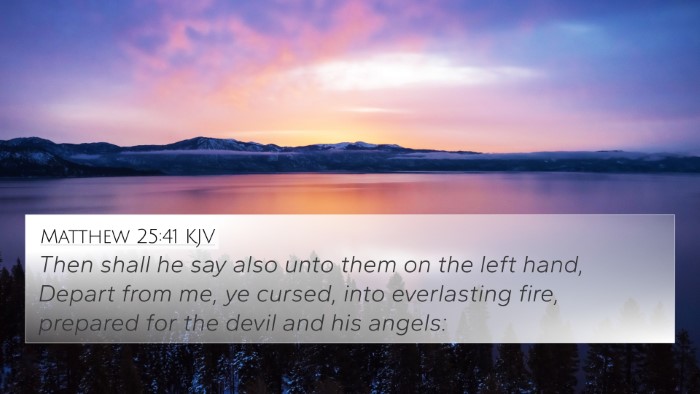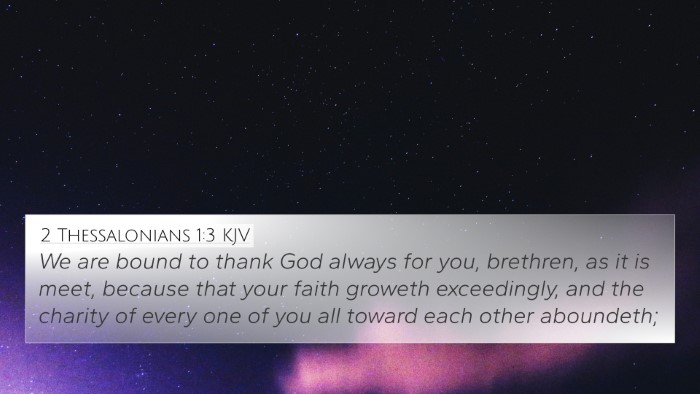Bible Verse: Luke 12:59
Verse Text: "I tell you, you will not get out until you have paid the very last penny."
Summary and Meaning of Luke 12:59
This verse emphasizes the importance of making amends and settling disputes before it is too late. The context of this passage is rooted in Jesus’ teaching about the urgency of reconciliation and responsibility for one's actions. The message is profound, indicating that neglecting one's spiritual and relational obligations could lead to serious consequences.
Context and Analysis
Jesus speaks about a scenario where a man, taken before a judge, must pay his debts. The phrase "you will not get out until you have paid the very last penny" illustrates the finality of debts and the necessity of accountability. It serves as an admonition concerning the eternal consequences of one's actions, urging individuals to resolve issues promptly.
Insights from Commentaries
-
Matthew Henry: Henry explains that this verse points to the necessity of dealing with our wrongs while we have the opportunity. He emphasizes the importance of settling disputes in a timely manner, as procrastination can lead to dire consequences.
-
Albert Barnes: Barnes highlights the parabolic nature of this teaching, suggesting that it serves as a warning to deal with sin and the futility of attempting to escape judgment. He remarks that the verse underscores the certainty of eventual accountability for one’s actions.
-
Adam Clarke: Clarke elaborates on the literal and metaphorical interpretations of "paying the very last penny," illustrating how it reflects on the spiritual balance and judgment. He draws parallels to the broader theme of judgment in the gospels, indicating human life is often subject to moral and divine scrutiny.
Cross-References
This verse can be linked to various other scriptures that reinforce its messages about accountability, reconciliation, and the consequences of sin. Below are notable cross-references:
- Matthew 5:25-26 - Jesus advises settling matters quickly to avoid harsh judgments.
- James 4:17 - Knowing the good one ought to do and not doing it is sin; emphasizing responsibility.
- Romans 14:12 - "So then, each of us will give an account of ourselves to God," reflecting personal accountability.
- Matthew 12:36 - Each person will give an account for every idle word they speak.
- Galatians 6:7 - "A man reaps what he sows," highlighting the consequences of one's actions.
- 1 Peter 1:17 - God, as a judge, will judge impartially based on our conduct.
- Proverbs 28:13 - Those who conceal their sins will not prosper; accountability is key.
- Luke 16:2 - The steward must give an account of his stewardship; the theme of accountability recurs.
- Matthew 18:23-35 - The parable of the unforgiving servant emphasizes the importance of forgiveness and settlement of debts.
- Hebrews 9:27 - It is appointed for man to die once, and after that comes judgment, reminding us of the finality of accountability.
Connections and Insights
The connections made in Luke 12:59 provide a rich framework for understanding not just the verse but a tapestry of Biblical teachings emphasizing reconciliation, responsibility, and the inevitable judgment. The verses highlighted instigate deeper study methods through cross-referencing Bible study, enabling readers to draw thematic connections throughout scripture.
Practical Application
As we reflect on Luke 12:59, believers are encouraged to make prompt reconciliations in their relationships, be attentive to their spiritual and financial obligations, and recognize the broader implications of their actions within God's divine framework. It poses a challenge for introspection regarding unresolved issues in our lives and encourages engagement with Bible concordance tools for further exploration of related scripture.
Thematic Bible Verse Connections
The themes within Luke 12:59 resonate with various aspects of Christian living, suggesting the need for awareness of our actions and their consequences. It connects to teachings about humility, accountability, forgiveness, and the significance of making peace with others. The urgency of “making it right” before it’s too late is a core tenet for believers.
Methods for Further Study
Utilizing tools such as a Bible cross-reference guide, individuals can immerse themselves in a comprehensive study journey exploring the interrelationships between the verses listed above and many others. Applying cross-reference methods facilitates deeper comprehension and reflects on how interconnected the teachings of Jesus are throughout the scripture.
Conclusion
Luke 12:59 serves as a profound reminder of the weight of one's decisions and the urgency of timely reconciliation. It calls believers to reflect on their lives, relationships, and spiritual obligations. Engaging in scriptural cross-referencing enriches the understanding of this and many other verses, creating a holistic comprehension of Biblical themes and their implications for daily living.

